Private sector urged to enter eco-IP arena
The Ministry of Planning and Investment (MPI) is urging a project steering committee to accelerate the transition of traditional industrial parks (IPs) to an ecological model as part of a nationwide eco-IP intervention initiative.
Deputy Minister of Planning and Investment Nguyen Thi Bich Ngoc said, “The project has contributed to the replication of the eco-IP model in Vietnam, in line with the National Green Growth Strategy for 2021-2030, Vietnam’s commitment to the United Nations’ Sustainable Development Goals, and the net-zero emissions commitment to 2050.”
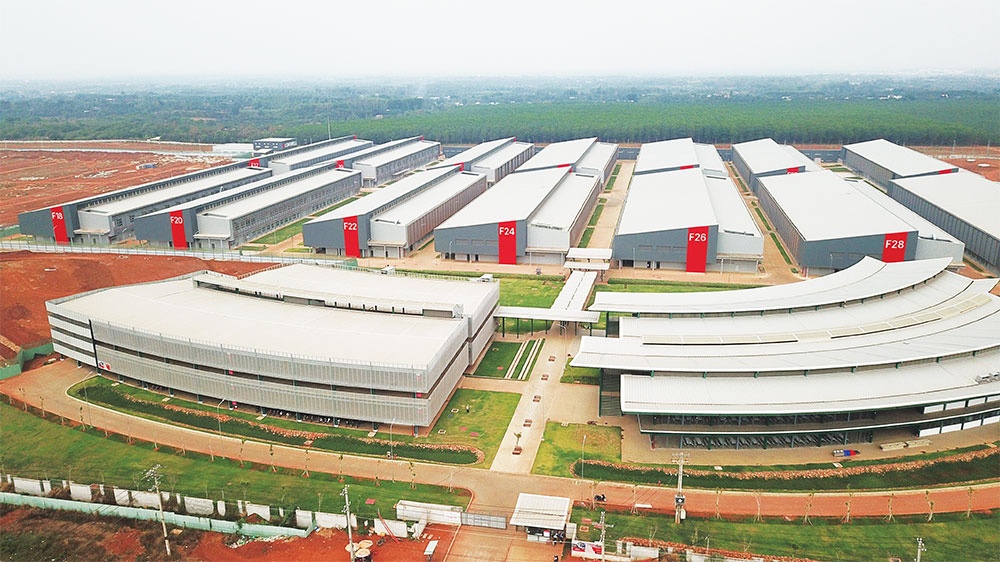 |
| Private sector urged to enter eco-IP arena, illustration photo. |
Developing eco-IPs is inevitable as many countries are applying the carbon tax mechanism on imported goods, the deputy minister added. “Meanwhile, many tenants in IPs are manufacturers for export, and they need a green certificate to export products. Thus, relevant parties continue to spread technical and financial support to many IPs at different levels, simultaneously building a mechanism for public-private dialogue to remove obstacles and speed up implementation of eco-IPs.”
Ngoc said that the MPI, other ministries, and localities were willing to cooperate with international organisations to build model eco-parks, which was the basis to extend the model across the country.
“Once the private sector establishes a basic network of eco-IPs, the Swiss State Secretariat for Economic Affairs (SECO) and the UN Industrial Development Organisation will support and consult on them,” she said.
At present, almost all eco-IPs in Vietnam are implemented under a pilot model funded by both organisations, in cooperation with the MPI.
The country is determined to gradually transition traditional IPs to ecological models. The government approved a plan so that by 2030, a total of 40-50 per cent of localities will make the shift. Up to 10 per cent of localities will add eco-IPs to their socioeconomic planning.
However, attracting an inflow of private investors to transform from traditional IPs to ecological models is difficult, let alone developing new eco-IPs, as developing one is more costly. It also takes a longer time to recoup investment capital. Meanwhile, there are still bottlenecks in implementation.
Werner Gruber, head of cooperation at SECO, said, “We believe that the transformation and development of eco-IPs is the first solution for zero carbon in Vietnam. Vietnam already has strategies and policies for this issue. However, the upcoming challenge is to put policies into practice, especially technological solutions.”
Another challenge is to determine the specific demand of the private sector, which is a foundation to establish a public-private cooperation mechanism, Gruber added, while it is necessary to have a criteria framework to recognise eco-IP standards.
Although Decree No.35/2022/ND-CP on the management of industrial and economic zones in Vietnam has been set up to drive the modernisation of the industrial park model, investors still lack specific guidelines. According to experts and representatives of cities and provinces, the decree is simply a premise for formatting eco-IPs as well as transitioning from traditional parks – investors can do nothing except submit an investment plan for approval until there is a specific circular available.
Nguyen Ngoc Hung, a representative of the Department of Debt Management and External Finance under the Ministry of Finance (MoF), said that one of the barriers during the transition from traditional IPs was a capital shortage.
“The MoF is assigned to deploy green financial capital, but at present, it is difficult to approach short-term loans with low-interest rates as Vietnam becomes a middle-income country. Thus, in 2023, one of the key missions is to determine power sources used in the transformation,” Hung said.
Nguyen Thi Dieu Trinh, deputy director of the MPI’s Department for External Economic Affairs, said that to promote the development of eco-IPs, besides mobilising finance from international organisations, it is necessary to expand green finance through commercial channels to more effectively mobilise strong resources from the private sector. “Our department will continue to support the project in connecting to find green finance sources and consider extending the project’s implementation duration,” Trinh said.
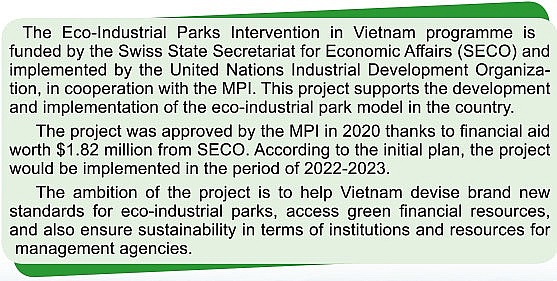 |
| Le Thanh Quan - Director general Economic Zones Management Department, MPI | |
During field visits to IPs across the country, many localities are looking forward to the government’s legal framework as a basis for developers and tenants to make the switch. Many businesses propose and express their desire to participate in a cleaner production environment, as well as join the industrial symbiosis network, which proves that promotions create a huge spillover effect in improving awareness about the benefits and importance of eco-IPs. | |
| Le Van Danh - Deputy director Dong Nai Industrial Zones Management Authority | |
At present, a number of manufacturers say that they are facing difficulties reusing treated wastewater despite meeting ISO standards. Meanwhile, salvaging natural resources and energy is among the leading criteria for eco-industrial parks. According to our calculation, the wastewater of the existing IPs is 145,000 cu.m per day and night, which is a huge resource to take advantage of. We expect that the steering committee of the project to focus on supporting Dong Nai to resolve this problem in 2023. Besides this, we expect that the authorities can consider recognising some IPs in the province as eco-IPs in 2023. In addition, manufacturers in the province expect to get a green certificate, as it creates a large advantage during the process of negotiating and signing contracts with international partners. | |
| Bui Ngoc Hai - Deputy director Haiphong Economic Zone Management Authority | |
The city wants to transform the existing 14 traditional IPs into ecological models, and simultaneously the 13 other planned IPs are to become eco-IPs. During the implementation of the pilot, we realised that there are many barriers. Notably, it is difficult to arrange sharing infrastructure for tenants. Besides this, the establishment of rooftop solar panels is not simple. We calculate that we can exploit 3,400MW of solar power from existing IPs, which is enough to operate the parks. However, there is no legal framework, and as a result, tenants wonder whether they have to adjust their investment certificate. Further, attracting manufacturers in eco-IPs is also problematic as operators have to ensure the sharing infrastructure. Meanwhile, manufacturers are uncertain, making it difficult to create a circular network for reusing each other’s water, treated waste, and energy sources. |
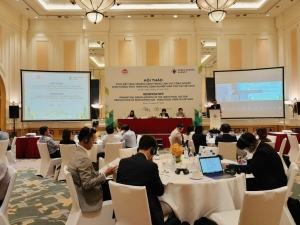 | Eco-industrial parks to become inevitable trend Vietnam will continue to encourage investors to both develop eco-IPs and transition from traditional to ecological ones, which is set to contribute to the national target of reducing greenhouse gas emissions. |
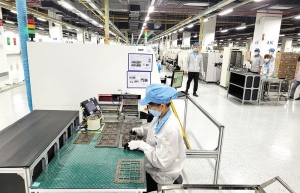 | Illustrating the critical need for top eco-industrial parks Vietnam is leaning towards international conventions when it comes to expanding its eco-industrial park strategy. Florian J. Beranek, lead expert of Responsible Business Development at the UN Industrial Development Organization, explains what this looks like, and how developers can be encouraged to go greener. |
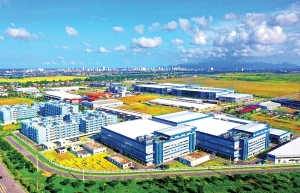 | Localities keen to implement advanced industrial parks Localities nationwide are eager to accelerate the construction of industrial parks to welcome new foreign investment capital inflows in 2023. |
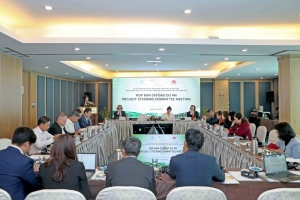 | Vietnam to promote eco-industrial parks with international partners The Steering Committee on the Development of Eco-industrial Parks in Vietnam, organised a meeting yesterday to discuss last year's results and set a course for the following two years of the scheme. |
What the stars mean:
★ Poor ★ ★ Promising ★★★ Good ★★★★ Very good ★★★★★ Exceptional
Related Contents
Latest News
More News
- Construction firms poised for growth on public investment and capital market support (February 11, 2026 | 11:38)
- Mitsubishi acquires Thuan An 1 residential development from PDR (February 09, 2026 | 08:00)
- Frasers Property and GELEX Infrastructure propose new joint venture (February 07, 2026 | 15:00)
- Sun Group led consortium selected as investor for new urban area (February 06, 2026 | 15:20)
- Vietnam breaks into Top 10 countries and regions for LEED outside the US (February 05, 2026 | 17:56)
- Fairmont opens first Vietnam property in Hanoi (February 04, 2026 | 16:09)
- Real estate investment trusts pivotal for long-term success (February 02, 2026 | 11:09)
- Dong Nai experiences shifting expectations and new industrial cycle (January 28, 2026 | 09:00)
- An Phat 5 Industrial Park targets ESG-driven investors in Hai Phong (January 26, 2026 | 08:30)
- Decree opens incentives for green urban development (January 24, 2026 | 11:18)

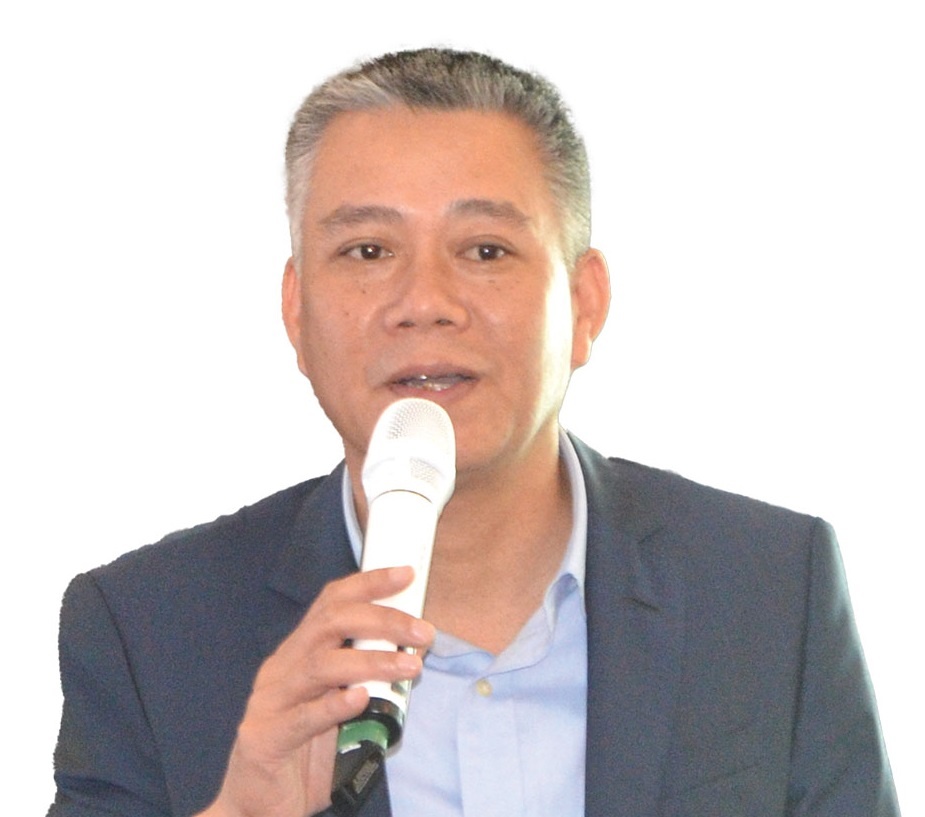
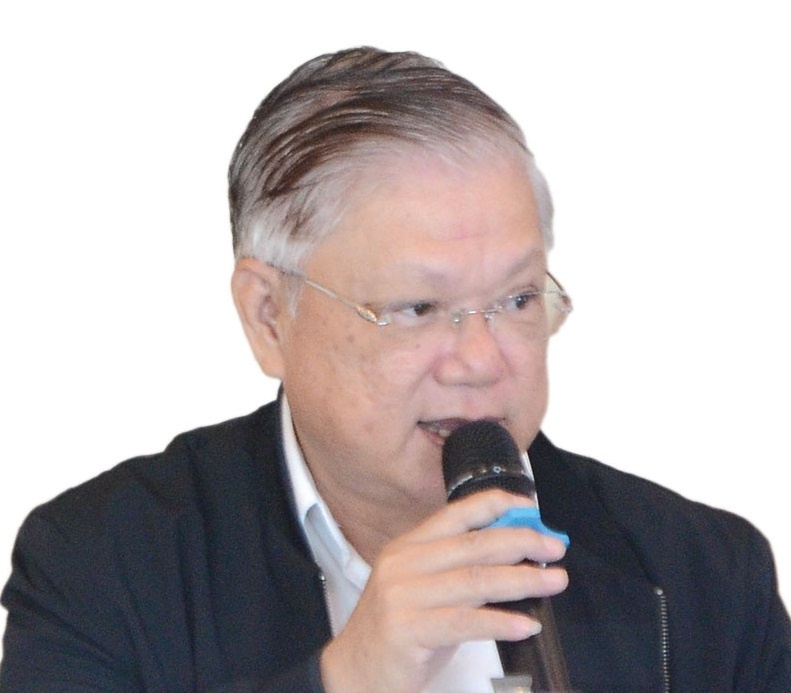
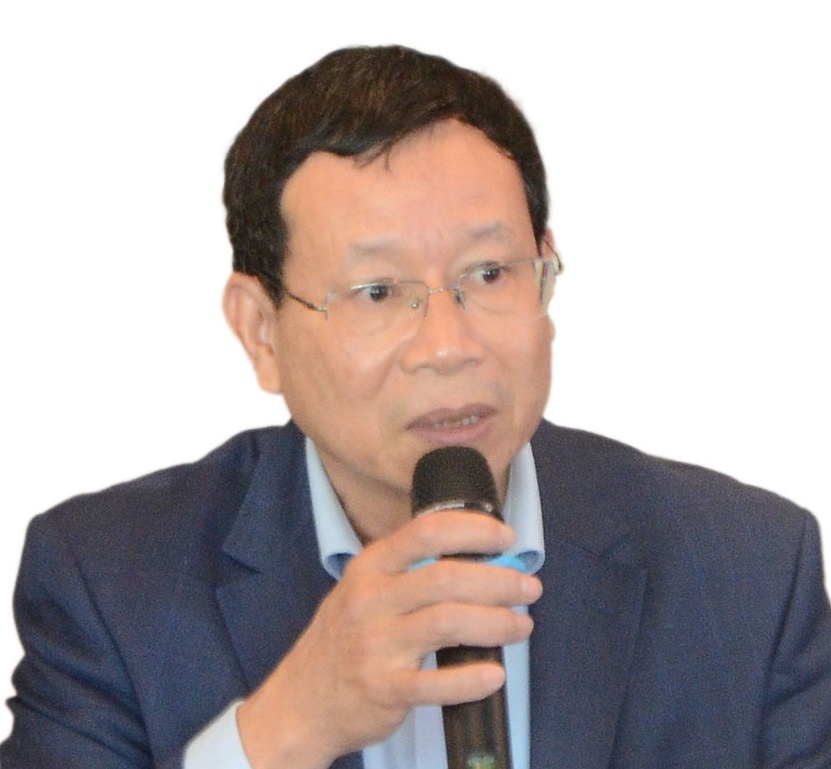
 Tag:
Tag:





















 Mobile Version
Mobile Version